The ever-popular betta fish is renowned for its feisty temper and stunning colors. Talked about less frequently is the betta’s relatively short lifespan.
In the wild, betta fish typically live for around two years.
With captive bettas, you can expect variation when it comes to life expectancy.
While most have an average lifespan of two to four years, some extraordinary specimens have lived for six years or more.
Compare the averages with anecdotal online reports for the longest-living betta fish. These tell of fish living seven, ten, or even fifteen years!
What impacts a betta’s lifespan and how can you help them to live longer? Keep reading to find out.
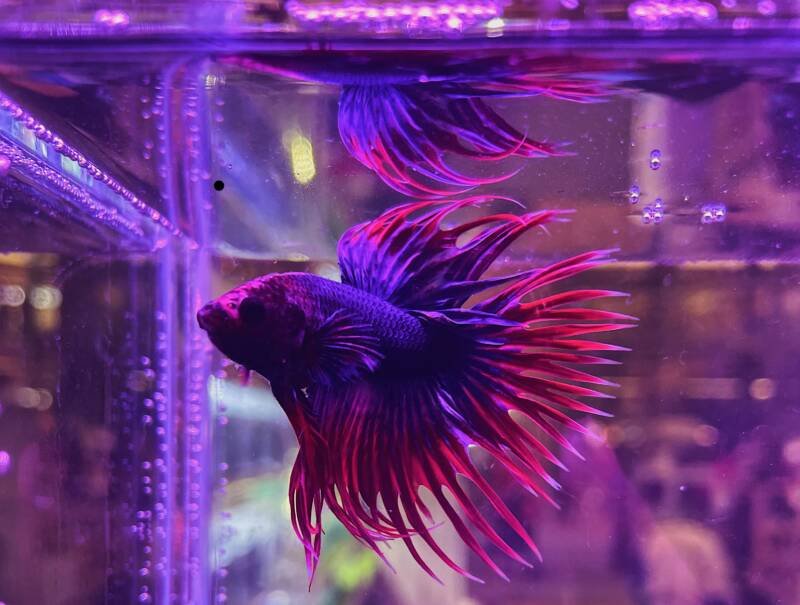
In this article
What Will Shorten a Betta’s Lifespan?
Two initial factors that determine betta fish lifespan are their age at the time you purchase them as well as the quality of care they received before you get them.
Once you have your fish, the quality of care that you provide can give your betta the best chance of living to their full potential.
The following will shorten your betta’s lifespan.
Inadequate Tank Size
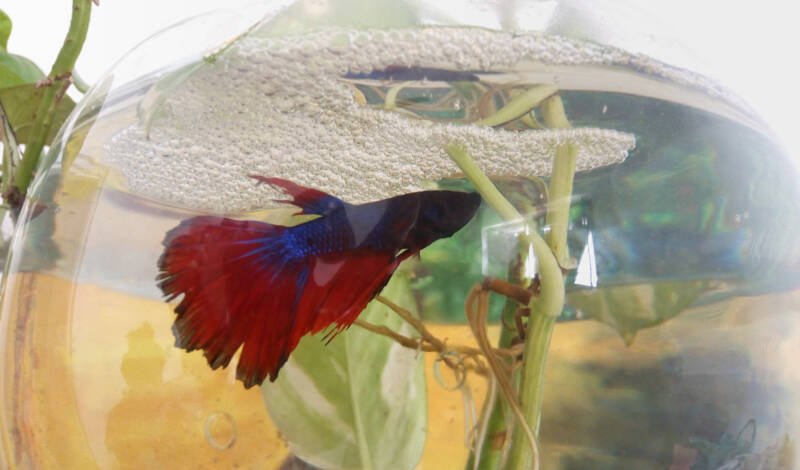
If you want your betta to have their best, longest life, the worst thing you can do is to house them in a bowl.
In a pet store, you often see bettas in small, two-gallon tanks, or worse, in plastic cups.
Keeping your fish in a tiny, unfiltered, unheated habitat is certain to elevate your betta’s stress levels and shorten their lifespan.
Poor Water Conditions
With any fish species, even those adapted to handle poor water quality, conditions that are constantly shifting or are chronically outside of their tolerance range will lessen the lifespan of your fish.
Stress
Long-term exposure to stress, be it from water conditions or improper tank mates, will lower your fish’s immune system. This, in turn, will leave them susceptible to infection or disease.
Genetics
Your betta may be destined for a shorter lifespan simply through their genetic makeup.
Purchasing fish from a reputable breeder can give you the assurance of better breeding practices and genetic lineage.
Old Age
It can be difficult to determine a betta fish’s actual age when they are purchased from a commercial pet store. These fish may already be six months of age or older.
With an already short lifespan, getting an older fish is not ideal.
How Can You Extend Your Betta’s Lifespan?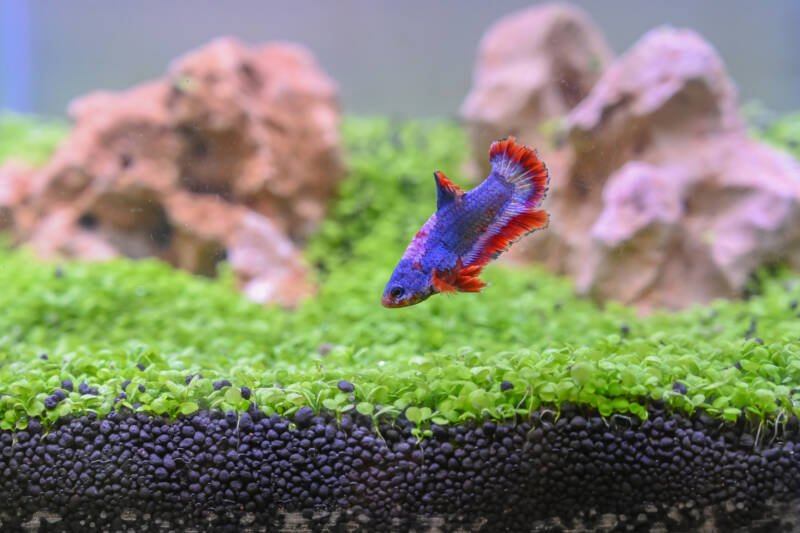
You cannot control the care provided to your betta before you get them, but once you have them, you can do much to ensure they have the best care possible to live their longest life.
Purchase from a Reputable Breeder
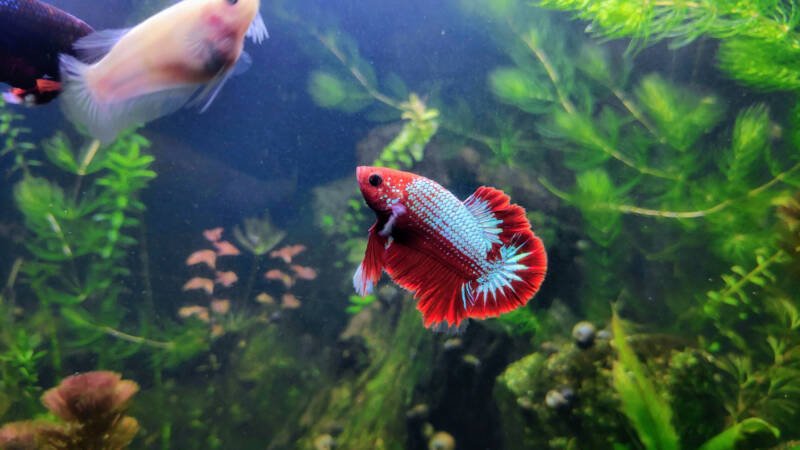
Look for local or online breeders that can verify the fish’s age and the care provided.
Additionally, you will have some reassurance that the fish you are buying is free of parasites and disease.
The fish you receive should be brightly colored with little to no visible fin or scale damage.
They should be highly active and not listless.
Provide Them with the Right Tank Setup
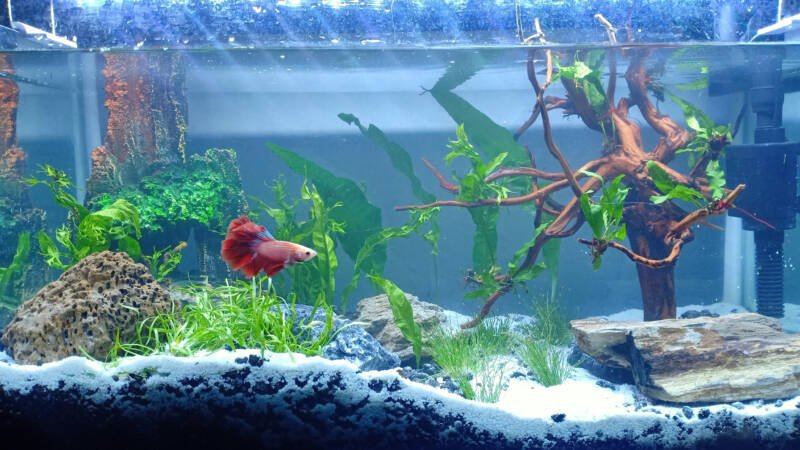
Your betta will need a tank of appropriate size.
Five gallons (20 l) will give them the space they need to explore and swim (exercise is as important to fish as it is to humans!).
A larger tank will also allow space for plants and decorations that will make your fish more comfortable.
Set Appropriate Water Parameters
Water conditions are key to keeping your fish healthy. The following are the best parameters for bettas:
- Water temperature: 76 and 80°F (24 to 26°C)
- pH: 6.5 to 7.5 (7.0 is ideal)
- Hardness: 3 to 4 dGH (although they can tolerate 2 to 12 dGH)
- Ammonia and nitrites: < 0.25 ppm
- Nitrates: < 20 ppm
Make sure to condition the water prior to adding it to the tank.
Conditioning removes the chlorine present in standard tap water.
Add Decorations and Plants
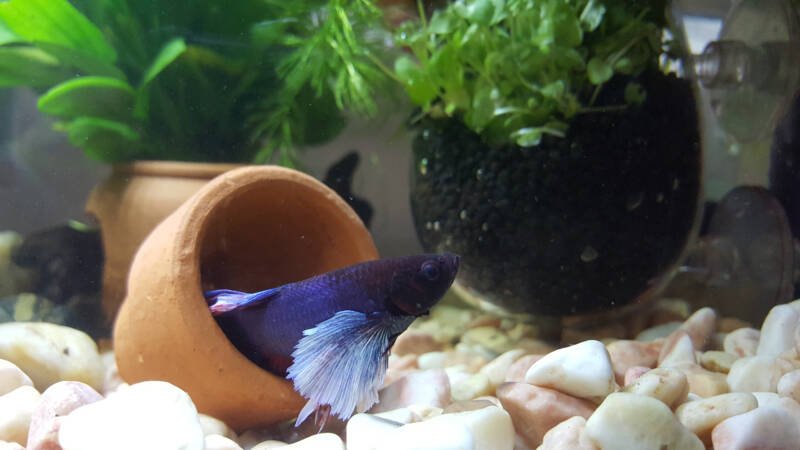
Because the betta comes from waters rich in plant life, they will appreciate the same in their aquarium.
Java moss, java fern, anacharis, and anubias are all excellent choices.
Live plants are best, but if you must go with artificial, use silk varieties that will not harm your betta’s delicate fins.
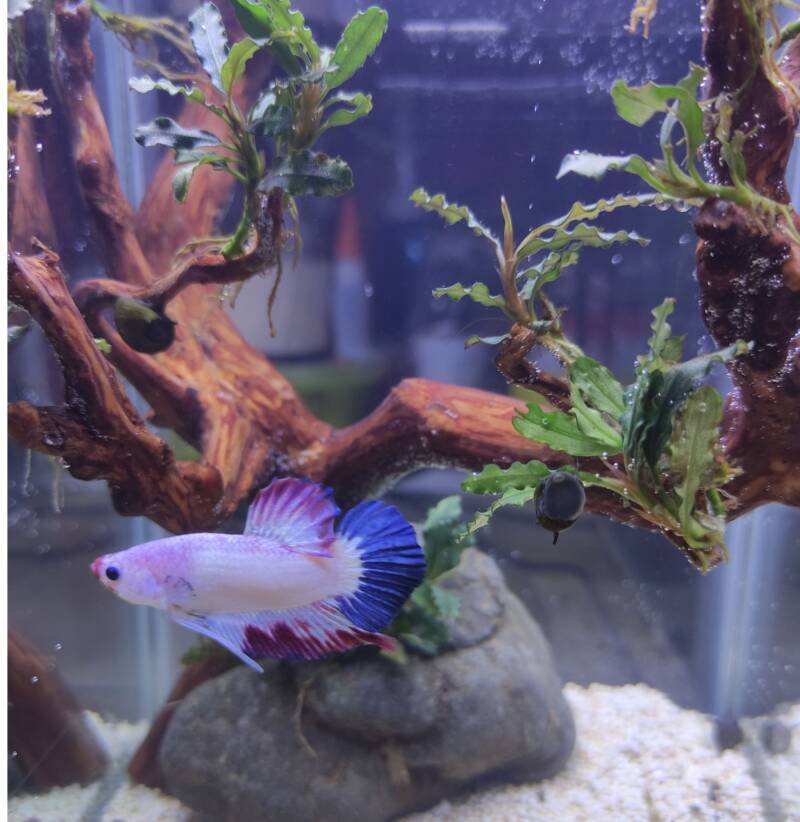
The same goes for other decorations: select items with softer, rounded edges.
Ceramic logs or leaf hammocks will give your bettas places to shelter and relax.
Avoid shells and coral gravel, which can impact the pH of your water.
Other Equipment Needed
Install a good quality filter to help keep the tank water clean and low in toxic chemicals, such as ammonia and nitrites.
In addition, the filter can help to oxygenate the water, which your betta will appreciate.
Be sure to select a filter that is appropriate for the size tank you have. One with an adjustable flow rate is best, as bettas do not favor a strong current.
Clean the filter media once a month.
A heater and thermometer are necessary to keep the water within appropriate ranges. These items are especially important given the smaller aquarium size, which can be prone to rapid shifts in water temperature.
Finally, cover the tank with a well-fitting lid to prevent your betta from jumping out.
Clean Their Tank Regularly
Use a gravel vacuum to clean leftover food and detritus from the substrate. This allows you to siphon off a portion of the water at the same time.
Replace between 10 to 20 percent of the water each week and check the water chemistry after doing so.
Your tank will need a deep clean about once per month, including cleaning the glass and decorations.
Feed Them a Quality Diet
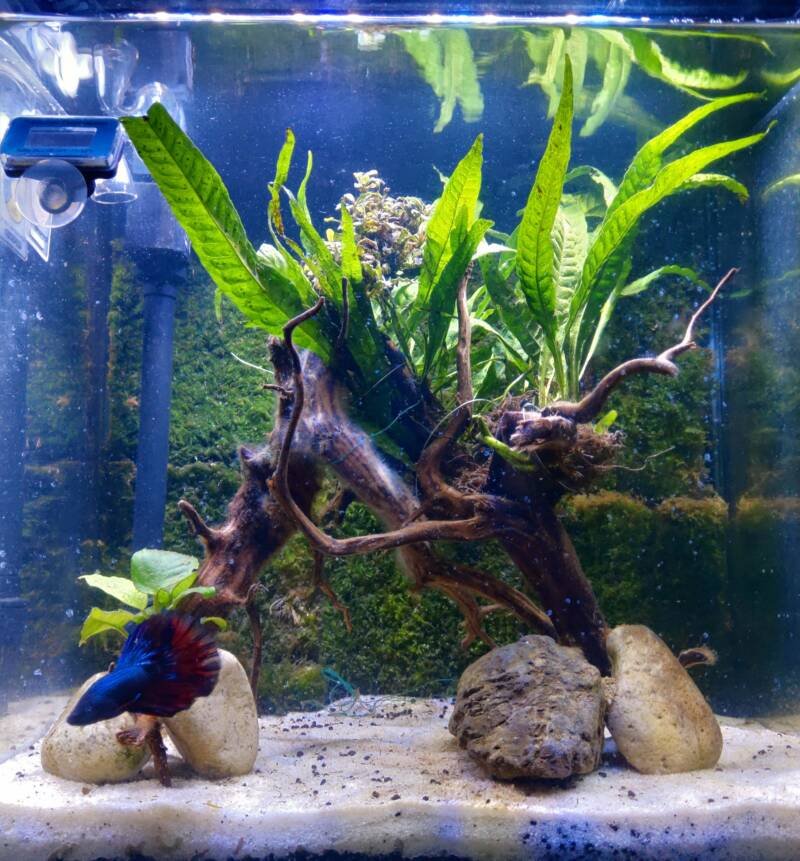
Betta-specific pellets have the protein, fiber, and nutrient mix that your fish needs to thrive.
These pellets stay near the water surface, which is perfect for the way a betta naturally feeds.
Supplement your fish’s diet with an occasional live or frozen treat twice weekly. Try mysis shrimp, mosquito larvae, frozen bloodworms, or brine shrimp.
If you select freeze-dried foods, be sure to soak them beforehand to prevent your fish from bloating.
But Do Not Overfeed Them
Your tiny betta will only need two to three pellets twice per day. Any more than this can cause your fish to be lethargic, bloated, or constipated.
Excess food can also impact your tank’s water quality as it decays, so stick to a strict feeding schedule.
Treats can be given once or twice a week.
Use Fresh Food
You may find that your betta does not go through all the food in its container before the food expires.
Avoid giving your betta expired food as it is lower in key nutrients. Discard and replace your betta’s food every six months.
Choose Tank Mates Carefully
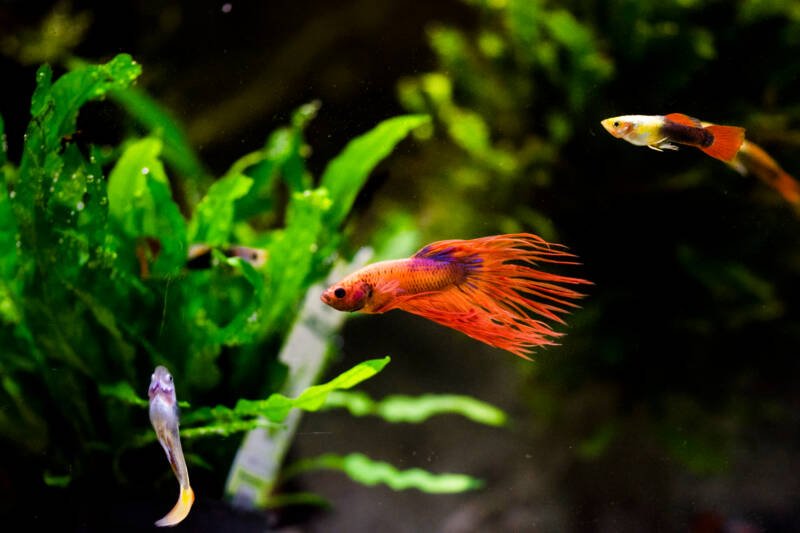
In addition to needing a stimulating tank environment to ensure their health and long life, betta fish enjoy the company of others.
This may seem at odds with their reputation as fighting fish; however, it is generally the male of the species that is aggressive when kept with another male.
Bettas can live in the following configurations with a variety of other species:
- A single male betta
- A single female betta
- A sorority of females.
Remember that each betta has a unique temperament. Some may be amenable to having roommates, while others are happiest when kept alone.
Things to Consider
When selecting a tank mate for your betta, first make sure they can tolerate the same water conditions.
Ensure you have a large enough tank to house both the betta and the other species, remembering that your betta needs to establish a territory.
Finally, avoid brightly colored species or those prone to fin nipping.
Recommended Tank Mates
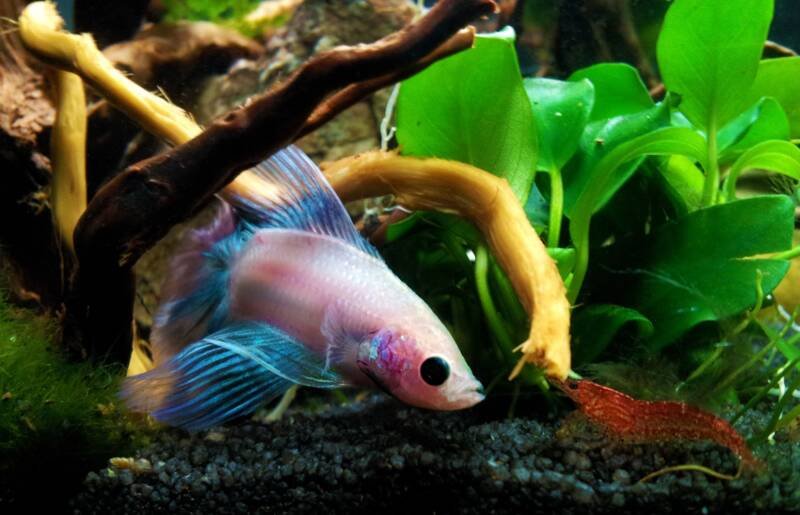
- Peaceful bottom dwellers: cories, otos, loaches
- Less colorful schooling fish: rasboras, guppies (avoid colorful specimens or males with long fins)
- Snails
- Shrimp
Closing Thoughts
Betta fish have a lifespan that is on the shorter end, so you will want to do everything you can to ensure they live as long as possible.
Setting up a spacious tank with stable water conditions should be first on your list.
Giving them the best diet possible with plenty of variety follows closely behind.
Finally, make their environment stimulating through the inclusion of plants, appropriate décor, and suitable tank mates.
With these considerations in mind, your betta should live a long and healthy life!
How long have your betta fish lived? To what do you attribute their longevity?